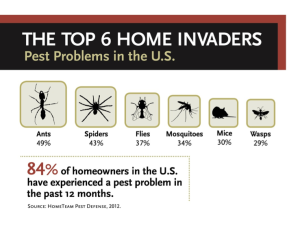











A national survey by HomeTeam Pest Defense, the third largest residential pest control company in the U.S., found that 84 percent of America’s homeowners experienced a pest problem in the past 12 months from April 2012. The top pest issues for homeowners in that particular year were ants (49 percent), spiders (43 percent), flies (37 …
A national survey by HomeTeam Pest Defense, the third largest residential pest control company in the U.S., found that 84 percent of America’s homeowners experienced a pest problem in the past 12 months from April 2012. The top pest issues for homeowners in that particular year were ants (49 percent), spiders (43 percent), flies (37 percent), mosquitoes (34 percent), mice (30 percent) and wasps (29 percent).
Pests appeared earlier than usual in 2012 due to warm winter, early spring and recent heavy rains. Termite swarms were observed in Texas, Georgia and Florida, odorous house ants in the Mid-Atlantic, and scorpions in Arizona.
Additionally, HomeTeam’s national survey found that 80 percent of homeowners are concerned about pests in their home. The top pests homeowners worry about are termites, cockroaches, rats, bed bugs and mice. Termites are the greatest pest concern, worrying one in four, and 13 percent actually experienced termites in the last 12 months. Nearly one quarter (22 percent) of homeowners had experienced structural damage to their home from a pest problem.
Eighty percent of homeowners were also concerned about being exposed to bed bugs when traveling, and most (81 percent) are not confident they know how to prevent bringing bed bugs into their home.
While many homeowners (54 percent) treated pest problems on their own, two-thirds of the do-it-yourselfers were unable to resolve their problem completely. Half of homeowners (51 percent) said using a pest control service is a necessity, and working with a company that guarantees its work was very important to almost everyone (95 percent). Treatments that would not harm children and pets were a high priority for 80 percent. HomeTeam offers the following quick tips to prepare your home and prevent pest infestations:
Additional data is available from the HomeTeam Pest Defense survey related to national pest trends and the pest control habits of homeowners, as well as highlights from the four major regions of the country and several local markets. The survey also revealed interesting findings in:
Parenting/Children: Forty-five percent of parents with children age 6-17 are not confident their child knows which pests are harmful and should be avoided.
Pets: Fleas and ticks remain the top pest issues for pets. More than half (53 percent) of pet owners have ever experienced an issue with fleas.
Real Estate: Half of people (51 percent) say they don’t think about pests when house hunting, but several pests including termites, bed bugs, rodents and cockroaches are deal breakers if seen in a potential home.

About the Survey
In February 2012, HomeTeam Pest Defense conducted a nationwide survey of homeowners to uncover the current trends and beliefs related to pests and pest control. The survey examined pest issues and pest-related topics related to travel, children, pets and home buying/selling. The survey consisted of 1319 respondents across the U.S. All respondents were homeowners over the age of 18. The survey’s margin of error is +/- 5 percent at the 95 percent confidence level. QMobius and Aperio Insights provided research and analysis.
About HomeTeam
HomeTeam Pest Defense, a recognized leader in the pest management industry, is the nation’s third largest residential pest control company. The company offers pest and termite control services using traditional treatment methods and advanced products, such as the innovative Taexx® built-in pest control system. The company has 50 branch locations throughout the Mid-Atlantic, Southeast, Mid-Central, Southwest and Western states. HomeTeam is a wholly-owned subsidiary of Atlanta-based Rollins, Inc. (NYSE:ROL). You can learn more about Rollins or HomeTeam at www.rollins.com or www.pestdefense.com.
